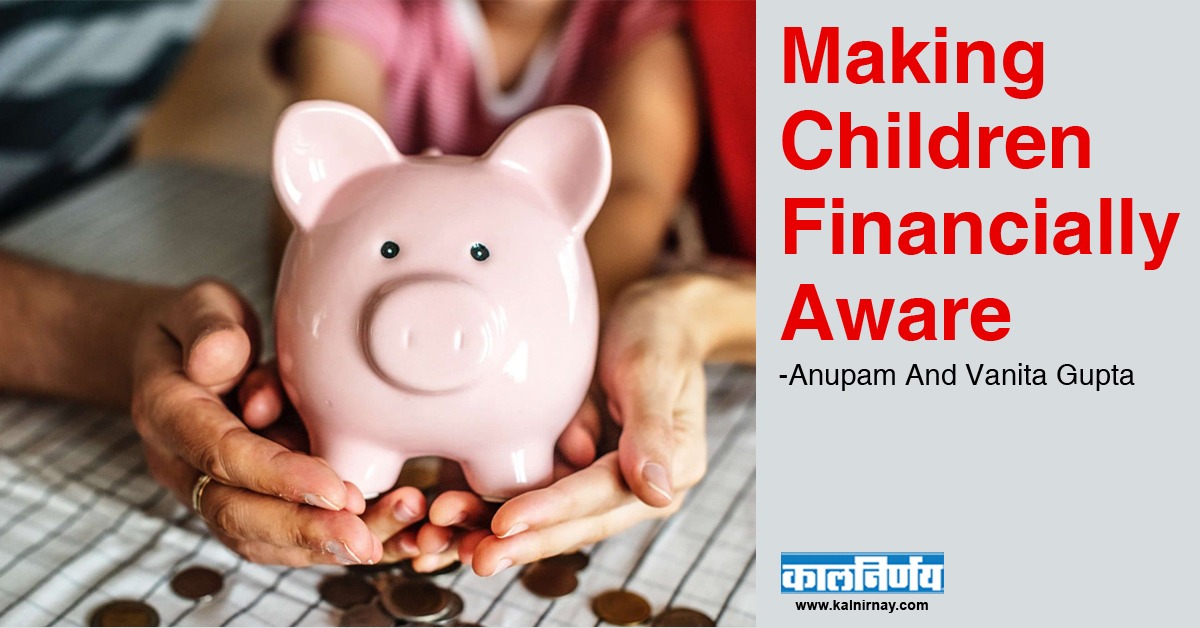Financial health, like physical health, is extremely important in life. Physical and financial(finance) health affects almost every area of our life. We work hard every day, some of us even more than 12 hours, six days a week. Life is busy. Our hard work gets us a salary (or business income) with which we pay our rent, credit card, home loan, car loan, etc. as also our daily groceries and utilities. Whatever is remaining after this is our savings. This is the starting point of understanding personal finance – income, expense, and savings. After that, we come to concepts like investing your savings and creating assets.
The obvious question is how early can you start teaching your kids the importance of investment, finance, savings and managing their own money? The answer is there is no fixed date, it is never too early and we should never be too late. The main benefit of starting early and making your kids financially aware is a) for them to learn concepts early b) use this knowledge to avoid making too many mistakes and c) start the process of investing early for their goals.
As parents, we work hard to earn our income. This is a basic concept that we should teach our children. Nothing in life is free, you have to work hard to earn money.
Everything we purchase with money has value and utility. Nowadays, we buy items of pleasure and luxury and there is nothing wrong in that, provided we stay within our means. But our children are very observant and watch our every move. Surely we do not want them to learn that life is about pleasure without working hard for it. Concepts of utility, hard work, effort, risk and reward are all part of financial education – and also play a major role in learning about life.
After the basics of personal finance, there are specific topics and these can be taught as a child grows. Usually, age five (or when a child enters primary school) is an ideal age to start. You can start from the absolute beginning – what exactly is money, what is the history of money, and what are the various forms of money. The RBI Museum in Fort, Mumbai is a must-visit for children and even for us parents. Indeed there are many new things I learnt when I went there as a parent! Cash, currency, credit cards, digital wallets are all easy to teach concepts and you can teach that with examples when you are doing transactions in these forms of money. A visit to the bank branch is also useful.
The concept of saving should be taught as early as possible and a piggy bank is an excellent tool for this purpose. Nowadays, there are theme parks for children where they can conduct an activity (like, say, working at the fire station) and earn ‘kid’ currency. The idea that you have to work hard to earn money and that you should save money for the future – these are core concepts that all children should know early on.
Starting from age ten (or when the child enters secondary school), we can teach children about what to do with their savings – or the concept of investment. It is important to teach them that the value of money falls (inflation) over a period of time and therefore this money has to be invested to protect its value. This becomes a good time to teach them about various financial products from credit cards to fixed deposits to shares and mutual funds.
The best way to teach them is not by reading from a book but by doing the transaction with your child. For example, if you are starting a Systematic Investment Plan (SIP) in a mutual fund, you can do this in front of your child and teach them why a SIP is important and what is a mutual fund. You can also sit with them and watch educational videos. The legendary investor, Warren Buffett, has an excellent video channel on YouTube called Secret Millionaires Club which is specifically for children.
Once your child is reaching his/her teenage years, you should encourage his/her curiosity to read books and learn more about personal finance. More importantly, focus on the practical application of money – for example, if your child then has a mobile phone, he/she should know to pay them on time and by using debit/credit cards or net banking or digital wallets. You should teach them practical tips such as never exceeding credit card limits, paying credit card dues in time, etc.
All these tips mentioned above should help in your child growing up to be financially aware and, hopefully, living a successful life that will help him/her to become financially independent. After all, money is merely a means to an end. Living a healthy and fulfilling life is a reward and financial independence is only a means to achieve this goal.
To read more English blogs, visit our blog section.
Anupam and Vanita Gupta

